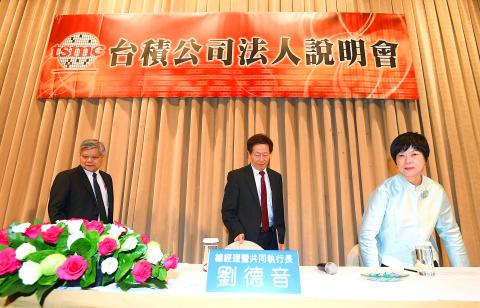Taiwan Semiconductor Manufacturing Co (TSMC, 台積電), which supplies chips for Apple Inc’s iPhone 6S smartphones, yesterday slashed this year’s capital spending by 27 percent, after weak demand for smartphone chips drove down quarterly net profits to their lowest in five quarters.
TSMC plans to spend US$8 billion on new equipment and facilities this year, rather than allocating a capital budget of between US$10.5 billion and US$11 billion as it estimated in June. This year’s spending is the lowest since 2011.
Earlier this week, Intel Corp cut its capital spending for the fourth time to US$7.3 billion amid a slowing market demand.

Photo: Chang Chia-ming, Taipei Times
“This year, due to weaker global economy, a stronger US dollar and volatile financial markets, consumer electronics market has been negatively effected. This results in a lack of growth in the overall semiconductor market,” TSMC co-chief executive Mark Liu (劉德音) said.
Liu cut his growth forecast for the world’s semiconductor industry to zero this year, from an annual growth of 3 percent that he estimated in June. He attributed the flat performance to customers’ adjusting their inventories amid sluggish demand for smartphone chips.
Chip designers are expected to see their revenues drop by 5 percent annually this year, Liu said.
However, TSMC will grow its revenue by about 10 percent this year from last year’s NT$762.81 billion (US$23.5 billion), partly because of strong US dollar against the New Taiwan dollar, Liu said.
Liu said he expected customers to reduce their inventories to a normal level at the end of this quarter.
TSMC chief financial executive Lora Ho (何麗梅) said the capital reduction reflects the company’s improving operational efficiency and favorable foreign exchange rate, rather than losses in orders or market share.
The company expects a higher capital budget next year as it is to ramp up its advanced 10-nanometer chip production in the fourth quarter of next year as scheduled.
“TSMC’s capital reduction indicates the company has better operational efficiency as its depreciation costs will only increase 11 percent annually,” said an analyst from an European brokerage firm, who declined to be named.
The analyst said TSMC might continue to outperform its peers even during the current slowdown and the company has a good chance to extend its partnership with Apple next year.
TSMC said revenue this quarter is expected to shrink moderately, by between 4 percent and 5.42 percent, from last quarter to a range from NT$201 billion to NT$204 billion. A significant ramp up of its 16-nanometer chips this quarter will partly offset slowing demand, the chipmaker said.
Gross margin is expected be between 47.5 percent and 49.5 percent this quarter, from 48.2 percent last quarter, it said.
Last quarter, net profit fell 5.1 percent to NT$76.33 billion from NT$79.42 billion in the previous quarter. Last quarter’s figure included a loss of NT$2.8 billion from the company’s solar business.
Commenting on potential investments in China, Ho said the company is cautiously evaluating the possibilities. The company is in no rush to build another factory there in the short term, Ho said.

‘SWASTICAR’: Tesla CEO Elon Musk’s close association with Donald Trump has prompted opponents to brand him a ‘Nazi’ and resulted in a dramatic drop in sales Demonstrators descended on Tesla Inc dealerships across the US, and in Europe and Canada on Saturday to protest company chief Elon Musk, who has amassed extraordinary power as a top adviser to US President Donald Trump. Waving signs with messages such as “Musk is stealing our money” and “Reclaim our country,” the protests largely took place peacefully following fiery episodes of vandalism on Tesla vehicles, dealerships and other facilities in recent weeks that US officials have denounced as terrorism. Hundreds rallied on Saturday outside the Tesla dealership in Manhattan. Some blasted Musk, the world’s richest man, while others demanded the shuttering of his

TIGHT-LIPPED: UMC said it had no merger plans at the moment, after Nikkei Asia reported that the firm and GlobalFoundries were considering restarting merger talks United Microelectronics Corp (UMC, 聯電), the world’s No. 4 contract chipmaker, yesterday launched a new US$5 billion 12-inch chip factory in Singapore as part of its latest effort to diversify its manufacturing footprint amid growing geopolitical risks. The new factory, adjacent to UMC’s existing Singapore fab in the Pasir Res Wafer Fab Park, is scheduled to enter volume production next year, utilizing mature 22-nanometer and 28-nanometer process technologies, UMC said in a statement. The company plans to invest US$5 billion during the first phase of the new fab, which would have an installed capacity of 30,000 12-inch wafers per month, it said. The

MULTIFACETED: A task force has analyzed possible scenarios and created responses to assist domestic industries in dealing with US tariffs, the economics minister said The Executive Yuan is tomorrow to announce countermeasures to US President Donald Trump’s planned reciprocal tariffs, although the details of the plan would not be made public until Monday next week, Minister of Economic Affairs J.W. Kuo (郭智輝) said yesterday. The Cabinet established an economic and trade task force in November last year to deal with US trade and tariff related issues, Kuo told reporters outside the legislature in Taipei. The task force has been analyzing and evaluating all kinds of scenarios to identify suitable responses and determine how best to assist domestic industries in managing the effects of Trump’s tariffs, he

Taiwan’s official purchasing managers’ index (PMI) last month rose 0.2 percentage points to 54.2, in a second consecutive month of expansion, thanks to front-loading demand intended to avoid potential US tariff hikes, the Chung-Hua Institution for Economic Research (CIER, 中華經濟研究院) said yesterday. While short-term demand appeared robust, uncertainties rose due to US President Donald Trump’s unpredictable trade policy, CIER president Lien Hsien-ming (連賢明) told a news conference in Taipei. Taiwan’s economy this year would be characterized by high-level fluctuations and the volatility would be wilder than most expect, Lien said Demand for electronics, particularly semiconductors, continues to benefit from US technology giants’ effort